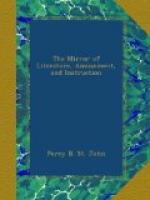It would be tedious to dwell on the well-known process of cotton spinning; but as this manufactory produces the cleanest and most perfect yarn made in England, of its numbers from 6 to 100, it may be worth while to state, that this perfection appears to arise, from the systematic perfection of all the machines, and from the astonishing cleanness of every part of this great factory. The wheels are as bright as the grate of a good housewife’s drawing-room; every action is complete in its way, and though cotton is a dusty article, yet I no where saw either dirt or dust. At the same time, order prevails throughout, for as the main shaft gives no respite to the carding, roving, and spinning machines, so every attendant diligently and silently watches the lines of bobbins which are performing their miraculous evolutions, while the other apparatus are correcting and regulating the stages and steps of the production.
The whole is turned by eight or nine water wheels, of about twenty-four feet diameter, and twenty feet in length. The fall is about twenty feet, and the admirable contrivances of revolving balls (adopted in the steam-engine) are affixed, to render the power uniform, by varying the depth of the falling stream. In truth, it is one of the features of the entire establishment, that all, that can be performed by machinery, is so performed, and that the machinery is the very best for its purpose, and in many instances which I witnessed, as true, as decided in its action.
After the thread is wound into hanks, it is bleached at a distinct manufactory for that purpose; but as bleaching is a mere chemical operation, and the means are either known and not curious, or secret, and not proper to inquire about, I did not visit this branch of the establishment.
The first of the works on this spot, was built by Mr. Jedediah Strutt, father of the brothers, William, George, and Joseph, about fifty years since. Arkwright invented the spinning machines, while a barber’s apprentice. He was joined by one Need, and they expended L14,000. with uncertain success. Wright, the banker, of Nottingham, hesitated to make further advances, and, at this juncture, they were joined by Mr. Jedediah Strutt, a careful man, with the necessary credit or capital, and the result was, the realization of princely fortunes, and the enriching even the nation itself. On the expiration of their partnership, Arkwright went on by himself at Cromford, and the Strutts for themselves at Belper. A spirit of detraction would make it appear that Arkwright stole the invention of another, but Mr. William Strutt, who knew him well, and is a competent judge on such subjects, assured me that Arkwright was a man of very superior talents as a mechanic, and quite equal to such an invention. I saw two portraits of him in Mr. Strutt’s house, and no higher proof could be given of his personal respect for Arkwright, while he never failed to speak of him with enthusiasm, as a man of original talents.




